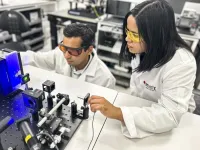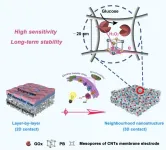(Press-News.org) New York, NY, June 14, 2023 — The New York Academy of Sciences and the Leon Levy Foundation announced today the first cohort of Leon Levy Scholars in Neuroscience; a continuation of an earlier fellowship program started by the Foundation in 2009 that has supported 160 fellows in neuroscience.
This highly regarded postdoctoral program supports exceptional young researchers across the five boroughs of New York City as they pursue innovative investigations in neuroscience and advance in their careers toward becoming independent principal investigators. Designed to broaden the field and to support researchers who might otherwise not have equal opportunity to secure postdoctoral funding, ten (10) scholars were selected for a three-year term from more than a dozen institutions across New York City that offer postdoctoral positions in neuroscience.
“My husband, Leon, had a keen interest in studies of the brain after taking a psychology course as an undergraduate at City College of New York. He was fascinated by the minds of scientists,” said Shelby White, founding trustee of the Leon Levy Foundation. “We see these Leon Levy Scholars as the pathway to making great strides in neuroscience, so we are proud to support these gifted young researchers, providing them financial and career support, along with recognition, to advance their careers.”
“New York is an epicenter of neuroscience, with some of the best brain research being conducted in the United States,” said Nicholas Dirks, the Academy’s president and CEO. “Our distinguished jury selected 10 outstanding neuroscientists across the five boroughs conducting cutting-edge research. We are excited to be working with the Leon Levy Foundation to usher in this new group of young neuroscientists, providing guidance and financial support to encourage ground-breaking discoveries that will ultimately result in growth in this crucial field.”
The Scholars program features structured mentorship by distinguished senior scientists. Workshops will help Scholars with grant writing, as well as developing leadership, communications, and management skills. The programs will encourage networking, data sharing, cross-institutional collaboration and an opportunity for networking at an annual Leon Levy Scholars symposium.
The 2023 Leon Levy Scholars
Thiago Arzua, Columbia University
Recognized for: How information about stressful events is encoded in the brain and how it can be passed through generations.
Ana Badimon, The Rockefeller University
Recognized for: How contact system activation could affect the brain, and most notably the pathology of Alzheimer’s disease.
Shai Berman, Columbia University
Recognized for: How the body’s physiological states—particularly hunger— affect value-based decision making.
Cynthia Chai, Columbia University
Recognized for: Identifying the neural circuit and genetic elements that undergo the strongest selective pressures to enhance survival through the study of escape responses in closely-related fly species
Andrew Chang, New York University
Recognized for: How music and speech is perceived, processed and distinguished in the human brain and its relevance for individuals with communication disorders.
Jonathan Gill, NYU Langone Health
Recognized for: Distinguishing the neural circuits that are correlated with odor identity and behavioral choice
Kelvin Q. Laracuente, New York University
Recognized for: The neural circuitry of how we perceive visual social signals and how it relates to and integrates with other somatic sensory social input to shape social awareness.
Pablo Lituma, Weill Cornell Medicine
Recognized for: The role of RNA regulation in non-neuronal brain cells and its impact on neuronal function.
Brian Sweis, Icahn School of Medicine at Mount Sinai
Recognized for: Combining neuroeconomics and transcriptomics to examine decision-making dysfunction underlying regret processing in rodent stress models.
Geoffrey Terral, Albert Einstein College of Medicine
Recognized for Examining the morphology and connectivity of inhibitory neurons and subsequently, their functional ability to generate brainwaves.
About the Leon Levy Foundation
The Leon Levy Foundation continues and builds upon the philanthropic legacy of Leon Levy, supporting preservation, understanding, and the expansion of knowledge, with a focus on the ancient world, arts and humanities, nature and gardens, neuroscience, human rights, and Jewish culture. The Foundation was created in 2004 from Leon Levy’s estate by his wife, founding trustee Shelby White. To learn more, visit: www.leonlevyfoundation.org
About the New York Academy of Sciences
The New York Academy of Sciences is an independent, not-for-profit organization that since 1817 has been committed to advancing science for the benefit of society. With more than 20,000 Members in 100 countries, the Academy advances scientific and technical knowledge, addresses global challenges with science-based solutions, and sponsors a wide variety of educational initiatives at all levels for STEM and STEM-related fields. These include prestigious science awards programs. The Academy hosts programs and publishes content in the life and physical sciences, the social sciences, nutrition, artificial intelligence, computer science, and sustainability. The Academy also provides professional and educational resources for researchers across all phases of their careers. To learn more, visit www.nyas.org or
For more information about the Scholarship program, contact: LeonLevy@nyas.org
Media contact: Kamala Murthy | Kmurthy@nyas.org
END
June 14, 2023, TORONTO — Funding announced today by the Ontario Institute for Cancer Research (OICR) will help six Ontario-based research teams pursue their ultimate goal of improving the lives of people with cancer.
Funding comes through OICR’s Innovation to Implementation (I2I) program, which aims to help ensure new discoveries about preventing, diagnosing and treating cancer are adopted into healthcare policy and clinical practice.
“Every cancer researcher wants their work to have ...
NEW YORK (June 14, 2023)— Dr. Jonathan Weinsaft, an esteemed physician-scientist who focuses on clinical research and cardiovascular imaging, has been appointed chief of the Greenberg Division of Cardiology at Weill Cornell Medicine and NewYork-Presbyterian/Weill Cornell Medical Center, effective July 1.
The Greenberg Division of Cardiology, housed within the Weill Department of Medicine, is dedicated to diagnosing and treating patients with disorders of the heart and blood vessels that comprise the cardiovascular system.
In his new role, Dr. Weinsaft will further strengthen the division as a leader in scientific and technological ...
In a recent study, researchers created a diagnostic test to identify functional sperm in infertile men that could change the treatment of male infertility and assisted reproductive technology.
“Male infertility is a recognized issue and deserves scientific and clinical attention,” said Andrei Drabovich, an assistant professor of laboratory medicine and pathology at the University of Alberta and corresponding author of the Molecular & Cellular Proteomics study.
One in every six couples trying to conceive experience infertility issues. In fact, about 10% of men in the United States are infertile. The most ...
In the early 2000s, scientists from the UK made a worrisome discovery that the oceans are teeming with small particles of plastic (less than one millimeter in length) due to the continuous degradation of plastic waste. These microscopic particles of plastic have become a major environmental concern. Scientists classify these small particles as either microplastics or nanoplastics based on their size; the latter term is used exclusively for particles smaller than one micrometer.
These particles easily get embedded into the bodies of marine and freshwater animals, ...
Researchers have created a small device that ‘sees’ and creates memories in a similar way to humans, in a promising step towards one day having applications that can make rapid, complex decisions such as in self-driving cars.
The neuromorphic invention is a single chip enabled by a sensing element, doped indium oxide, that’s thousands of times thinner than a human hair and requires no external parts to operate.
RMIT University engineers in Australia led the work, with contributions from researchers at Deakin University and the University of Melbourne.
The team’s research demonstrates a working device that captures, processes and stores visual ...
SDE BOKER, Israel, June 14, 2023 – Photovoltaic technology is indispensable for our ability to mitigate climate change. Nonetheless, more than 70% of the energy made available to us by the sun is wasted in conventional photovoltaic cells. There is little hope for sustainable technological advancement without addressing this issue.
The operational temperature is a critical factor in a solar cell's ability to convert sunlight to free energy. Accordingly, much research has been directed toward understanding the temperature effects in the efficiency of photovoltaic solar cells. Surprisingly, ...
Glucose oxidase (GOx)-based biosensors have attracted much attention for their potential in rapid glucose detection and continuous monitoring, which are crucial for disease diagnosis and prevention, as well as for controllable production in sugar-making and fermentation processes.
The glucose oxidase/electrocatalysts/electrode (GOx/ECs/electrode) cascade system serves as the core part of most glucose biosensing devices (both invasive and non-invasive). However, patterned assembly of these cascade sensing units remains challenging, thus limiting the ...
Ishikawa, Japan -- Bone-conduction (BC) headphones enhance hearing capability by generating vibrations in bone or skin close to the ear, including the regio temporalis. They simultaneously leave the ear canal open to allow the surrounding air-conducted (AC) sounds for normal hearing. However, word intelligibility – recognition ability – is often poor during bone-conducted speech perceived using BC headphones due to the attenuation of its high-frequency components, especially under noisy conditions. While inserting ear plugs in the ear canal help improve ...
A new study from Australia, New Zealand and Germany published in the New England Journal of Medicine raises important questions about the success or otherwise of emergency medicine.
The study examined the drug tranexamic acid, which is commonly used to limit bleeding during surgery. However, its usefulness in emergency settings as a pre-emptive strike in life-threatening bleeding has been controversial, and recent studies have provided contradictory results about whether or not it saves lives or causes dangerous blood clotting.
The Pre-hospital ...
AMES, IA — Last month, the American Psychological Association and the U.S. Surgeon General both issued health advisories. Their concerns and recommendations for teens, parents and policymakers addressed a mounting body of research that shows two trends are intertwined.
Young people are using social media more, and their mental health is suffering.
Researchers at Iowa State University found a simple intervention could help. During a two-week experiment with 230 college students, half were asked to limit their ...






